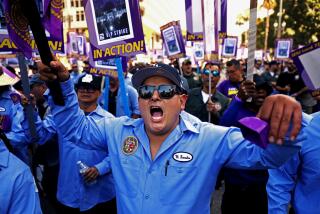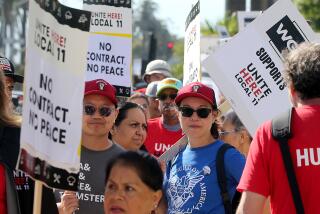Contract talks may be a crossroads in Garcetti’s relationship with labor
As behind-the-scenes contract talks with the unions representing more than half the city’s civilian workforce grind to a standstill, Los Angeles Mayor Eric Garcetti is facing the first meaningful test of his proclaimed resolve to curb organized labor’s sway at City Hall.
Sources familiar with the city’s position in the ongoing talks — normally kept confidential — say Garcetti’s administration is holding to an aggressive bargaining stance, demanding a three-year freeze on raises for roughly 20,000 city workers and greater contributions to employees’ healthcare and retirement costs, among other cost-saving concessions. After nearly a year of negotiating, union leaders haven’t budged and are planning a brief work stoppage Tuesday morning to put pressure on elected leaders.
To some extent, the impasse is emblematic of the squeeze public-employee unions have faced across the country since the Great Recession began to sap cities’ tax revenue. But it is also a bellwether for an ambitious young politician whose fraught relationship with labor has been a theme of his rise as the leader of America’s second-largest city.
A progressive Democrat and long-standing labor ally, Garcetti watched the city’s largest and most powerful public-employee unions throw their clout and cash behind his opponent in the 2013 mayoral race. He turned the snub to his advantage, casting the unions’ chosen candidate, former City Controller Wendy Greuel, as beholden to special interests.
The question now is what tone the mayor wants to set with unions for the rest of his tenure at City Hall — and beyond. Criticizing labor’s influence on local politics played well for Garcetti in a low-turnout citywide election. But in Democrat-dominated California, many still consider union support a prerequisite for the sort of higher office Garcetti, 44, is widely thought to crave.
“It would be extremely difficult to win statewide office without the support of organized labor,” said longtime Democratic strategist Darry Sragow.
Such support could be more difficult for Garcetti to secure if he stays his present course in contract talks with the Coalition of L.A. City Unions, which represents most civilian municipal employees. The coalition, which includes Service Employees International Union Local 721 and the American Federation of State, County and Municipal Employees District Council 36, has an enviable track record at City Hall. It won a nearly 25% pay raise in 2007, just as the economy was about to tank.
The city’s current contract proposals are less generous, according to those familiar with them. They include no raises for at least three years and a first-ever requirement that workers pay 10% of their healthcare premiums. Many currently pay no premiums.
Proposed pension reforms would increase the retirement age to 65, reduce pensions and eliminate free healthcare for retirees’ spouses. A similar package of cost controls was adopted when Garcetti was on the City Council, but unions are challenging that action in court.
The combined savings from the city’s demands could total more than $70 million per year, according to city budget analysts. The city’s annual budget is about $8.1 billion.
Employees and union leaders argue that they’ve already shouldered a fair share of the city’s financial burdens in recent years by agreeing to increase their pension contributions and taking furlough days, among other things.
Similar battle lines have been drawn in other U.S. cities, as Democratic mayors seeking to stabilize budgets have pushed back against the labor bosses they once called allies. Chicago Mayor Rahm Emanuel clashed energetically during his first term with teachers’ unions. In San Jose, Democratic Mayor Chuck Reed pushed through cost-cutting reforms to the city’s pension system, incurring the permanent enmity of labor.
“The unions will be supportive as long as you give them what they want,” said Reed, who returned to practicing law last year after he was termed out of office. “In hard times, it’s impossible to give them what they want.”
Garcetti doesn’t have full control over the city’s negotiating stance. He is part of a five-member committee that bargains with unions on behalf of the city. In an interview Friday, however, he said the city’s present demands represent his position.
“I think I originated it,” Garcetti said when asked if he supported the package of a proposed pay freeze and healthcare and pension changes.
“There’s nothing I’d like to do more than give workers a raise and even expand benefits,” he added. “But we can only spend what we have. I look forward to light coming down the tunnel soon, but it’s not there.”
Garcetti said his split with the coalition and other major labor groups in the 2013 mayoral race isn’t a factor in the current talks.
“I have tremendous respect for these unions. I’ve worked really closely with them,” he said. “The campaign feels like it was a lifetime ago.”
But late last week union leaders were calling attention to the distance between the two sides. On Thursday night, one coalition union sent an email urging a broad range of city employees, including clerical, animal-shelter and sanitation workers, to take part in a 10-minute work stoppage Tuesday morning.
“City of Los Angeles management has refused to budge from their concessionary agenda in our contract negotiations … we are standing together to let them know that we are tired of the attacks on middle-class jobs and public services,” the email said.
Coalition Chairwoman Cheryl Parisi declined to comment for this article, citing the confidentiality of contract talks.
Since taking office in July 2013, Garcetti has completed some deals with labor. That year, the union representing most Department of Water and Power workers — which opposed Garcetti’s election — agreed to forgo raises. City firefighters last year agreed to a two-year contract with a single, relatively modest 2% raise.
Late last year, the 4,500-member Engineers and Architects Assn., one of the few unions that backed the mayor in 2013, agreed to the same concessions the city is now seeking from the coalition. Some inside City Hall saw the little-publicized agreement as an important blueprint for contracts with other unions because it signaled the mayor’s willingness to drive a hard bargain even with a labor ally.
Not all are convinced such toughness would be a liability if Garcetti pursues higher office. As cities’ financial problems grow more acute and taxpayers pick up the tab, some see more risk, even for Democrats, in acceding to organized labor than in crossing it.
In five or 10 years, “it will be politically in vogue for anyone who had a reformist position” on controlling expenditures on public employees, said Arnie Steinberg, a GOP strategist and former pollster for Mayor Richard Riordan. Garcetti, he said, “probably has the ability to stake out a leadership position now as someone who was making tough decisions.”
Twitter: @PeteJamison
More to Read
Sign up for Essential California
The most important California stories and recommendations in your inbox every morning.
You may occasionally receive promotional content from the Los Angeles Times.











